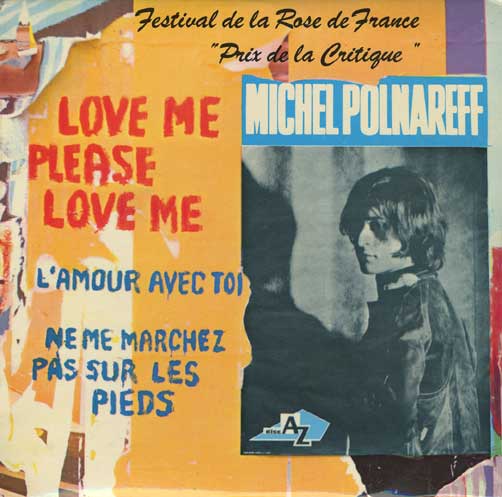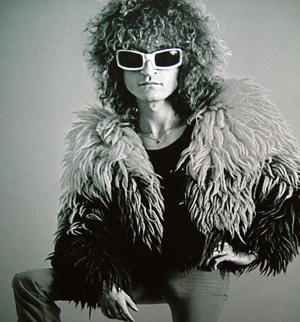

Lyrics to Love Me Please Love Me :
Love me, please love me
Je suis fou de vous
Pourquoi vous moquez-vous chaque jour
De mon pauvre amour ?
Love me, please love me
Je suis fou de vous
Vraiment prenez-vous tant de plaisir
A me voir souffrir
Si j'en crois votre silence
Vos yeux pleins d'ennui
Nul espoir n'est permis
Pourtant je veux jouer ma chance
Même si, même si
Je devais y brûler ma vie
Love me, please love me
Je suis fou de vous
Mais vous moquerez-vous toujours
De mon pauvre amour ?
Devant tant d'indifférence
Parfois j'ai envie
De me fondre dans la nuit
Au matin je reprends confiance
Je me dis, je me dis
Tout pourrait changer aujourd'hui
Love me, please love me
Je suis fou de vous
Pourtant votre lointaine froideur
Déchire mon cœur
Love me, please love me
Je suis fou de vous
Mais vous moquerez-vous toujours
De mes larmes d'amour ? 
从图片上看像是在巴黎蒙特马特Montmartre 一带, 据说Michel Polnareff最开始就是在
听了Michel Polnareff唱的歌《Love me, please love me爱我,请爱我》, 非常难忘,被他的歌声感动,也很想了解他更多。
Michel Polnareff1944年出生于一个艺术之家,妈妈是跳舞的, 爸爸曾与法国著名歌星Edith Piaf 一起工作过, Michel Polnareff 5岁就开始学音乐,是一个非常好的音乐学生,载完成学业和服完兵役后他开始学吉他, 最开始他就在巴黎蒙特马特Montmartre 白教堂前的阶梯那弹弹吉他
Michel Polnareff, born in Nérac (Lot-et-Garonne) on 3 July 1944, is a French singer who was very popular from the mid-1960s until the early 1980s. While his commercial success is considerably smaller nowadays, he is still active and critically respected.
Michel was born into an artistic family: his mother, Simone Lane, was a dancer and his father, Leib Polnareff or Léo Poll worked with Édith Piaf. He learned piano by age five and was a very good music student. He learned the guitar, and after his studies, military service, and a brief time in insurance, he began to play his guitar on the steps of the Sacré Cœur.
Early successes
In 1965, Polnareff won the Disco Revue prize in Paris. This victory let him record a disc at Barclay, but as part of the counterculture he turned down this opportunity. It was Lucien Morisse, then director at Europe 1, who made him sign with AZ. His first disc, La Poupée qui Fait Non (1966), was an unexpected success. Its new musical style and Polnareff's atypical image, crossed borders. During this period, he played concerts in Brussels for one week sharing the bill with Jeff Beck.
An atypical character
Polnareff also played with his image: black glasses, fancy trousers, and ambiguous provocations. His song L'Amour avec Toi could not be played before 10 p.m. because it was considered "pornographic" at the time in
Depression and distance
After a rest period in the
Polnareff in the USA
Then, in 1975, his song Jesus for Tonight made it onto the American Billboard. He also created the soundtrack for the exploitation rape drama Lipstick (1976), which starred American model Margaux Hemingway and her sister Mariel. But his success in the
Return to France
Polnareff made a surprise return to
Following the media attention in 1995-96, Polareff could have restarted his career as though nothing had happened. However, his fans still await, after more than ten years, an album which may never come. However, some of his early songs are becoming popular again, like "La Poupée qui fait non" by Mylène Farmer and Khaled (1996), and "On Ira Tous au Paradis", which became the theme song of Restaurants du Cœur in 1998. His 1977 hit Lettre à France enjoyed a new success in 2004 following its inclusion on the French version of the Star Academy talent contest.
Polnareff today
He has a namesake in Jean Pierre Polnareff, a character in the JoJo's Bizarre Adventure manga series.
On 22 November 2004, and again on 18 December 2005, France 3 broadcast a one and a half hour documentary entitled "Michel Polnareff Dévoilé" ("Michel Polnareff Revealed"). It includes images from rare files mixed with interviews with media personalities like Marc-Olivier Fogiel, Jacques Séguéla, Jean-Luc Lahaye and Frédéric Beigbeder explaining to the televiewers what Michel Polnareff represented for them and for France. Polnareff also revealed that he was working on a new album. On 12 May 2006, Michel Polnareff announced that he would be giving a series of concerts between 2 March and 14 March 2007. Ticket sales rocketed, showing that Polnareff has not lost his gleam. On Bastille Day, 2007, Polnareff gave a free concert.
In 2001, death rapper Necro sampled Polnareff's "Voyages" for his song "Light My Fire". English band The Shortwave Set sampled this song as well for their single "Is It Any Wonder?" in 2005. Masher (L)SD sampled "Sous Quelle E'toile Suis Je ne?" for his tune "Howards' Thinking Clearly", on the CD "That's CRAZY Music!" (2005)
Trivia
His first hit La Poupée qui fait non (1966), recorded in London, featured Jimmy Page as a session player.
Albums
- Love me Please Love me (1967)
- Le Bal des Laze (1968)
- Polnareff's (1971)
- Michel Polnareff (1974)
- Fame à la Mode (1975)
- Lipstick (1976) original motion picture soundtrack
- Coucou me Revoilou (1978)
- Bulles (1981)
- Incognito (1985)
- Kâma Sûtra (1990)
- Live at the Roxy (1996)
- Ze (Re) Tour 2007 (2007)
Famous songs
- "La Poupée qui Fait Non, Love me Please Love me, L'Amour avec Toi, Sous Quelle Étoile je suis Né" (1966)
- "Âme Caline, Le Roi des Fourmis, Mes Regrets, Ta Ta Ta Ta" (1967)
- "Le Bal des Laze, Y'a qu'un Ch'veu, Jour après Jour, Pourquoi Faut-il se Dire Adieu, Ring-a-Ding, J'ai du Chagrin Marie" (1968)
- "Tous les bateaux tous les oiseaux, Tout tout pour ma chérie" (1969)
- "Je suis un homme, Gloria" (1970)
- "Qui a tué grand-maman?" (1971)
- "Holidays, On ira tous au Paradis" (1972)
- "I love you because" (1973)
- "Fame à la mode" (1975)
- "Lettre à France" (1977)
- "Une simple mélodie" (1979)
- "Radio, Tam-Tam" (1981)
- "La belle veut sa revanche, Viens te faire chahuter, Dans la rue" (1985)
- "Goodbye Marylou" (1989)
- "Toi et Moi, LNA HO, Kâma-Sûtra" (1990)
- "Je rêve d'un monde" (1999)




